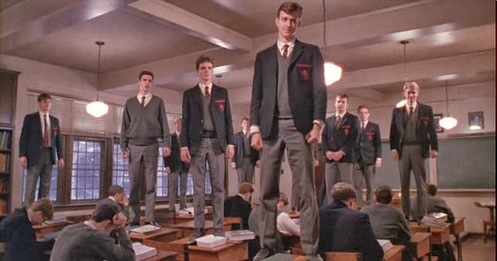For me, this was Robin Williams killing himself.
Robin Williams dying isn't just another celebrity death. Robin Williams was my fake uncle ("He was everybody's fake uncle!" a friend said yesterday). He was depressed. What artist hasn't been depressed? He was lost. Which of us haven't been lost? As my Facebook newsfeed multiplied throughout the week, I saw personal stories of colleagues, friends, and mentors all divulge the fact that they understood how Robin felt all too well. All the stories had two things in common: everyone suffers, and everyone suffers in silence.
Then the clips started to pop up. You know what I'm talking about. Robin Williams saying something really profound in Dead Poets Society, Robin Williams talking about death in Good Will Hunting and Bicentennial Man, Robin Williams being freed from the lamp in Aladdin. One by one, people pointed to words he'd once said under the guise of a character and declared that there was something profound about his work and his life and his death.
I agree.
"We don't write poetry because it's cute," he said in Dead Poets. "We write poetry because we are members of the human race."
Damn right, Mr. Keating.
He goes on to say that we do business and law in order to live, but we write and read in order to have something to live for.
How much truer can you get about art?
Mr. Williams meant something in this world, because of his art. He suffered, he hurt, and yet he gave his audiences hope. He was sad, but he still sang and danced and dressed in drag to promise us children of the nineties that we were still loved and we had a friend out there. Some of my first imaginary playmates were Batty and the Genie, and when my parents hit their separation, I took Mrs. Doubtfire's closing remarks to be the gospel. Later on when I was having a hard time dealing with adolescence, Peter Pan declared that he believed. Whenever we were weak, he made us stronger.
Even if he was feeling weak himself.
Tom Hanks conjures up a sentiment in Saving Mr. Banks that still hasn't left me, and I saw this movie all the way back during Christmas 2013. He plays Walt Disney, and he discusses the reasons for wanting to change the ending to Mary Poppins. He says that the world is bleak, but by writing hope, storytellers give hope. And maybe, just maybe, those dreams can someday come true.
Walt's dream was to make the happiest place on earth, teach kids that dreams aren't dumb, and the fact that Disney World exists is just one example of how Walt isn't full of, as Mr. Keating would say, excrement.
Robin didn't always have hope, but he knew how to give it. He knew what would make someone smile, cry, or just think for a goddam second. And because of him, we're all the better for it.
We don't do art because it's cute. We do art because we are members of the human race.
Robin is gone. We lost our Captain. He's not coming back. But he did leave his verse. Now he's somewhere standing behind us, whispering in our ear with that grizzled, hairy voice: "Carrrpe. Carrrpe Diieeem. Seize the Day, boys! Seize the Day!"
You're still here. And you don't get to go anywhere, because now it's your turn. How do you fight your own demons? How do you create hope for this world? Where is your poetry?
What will your verse be?

 RSS Feed
RSS Feed